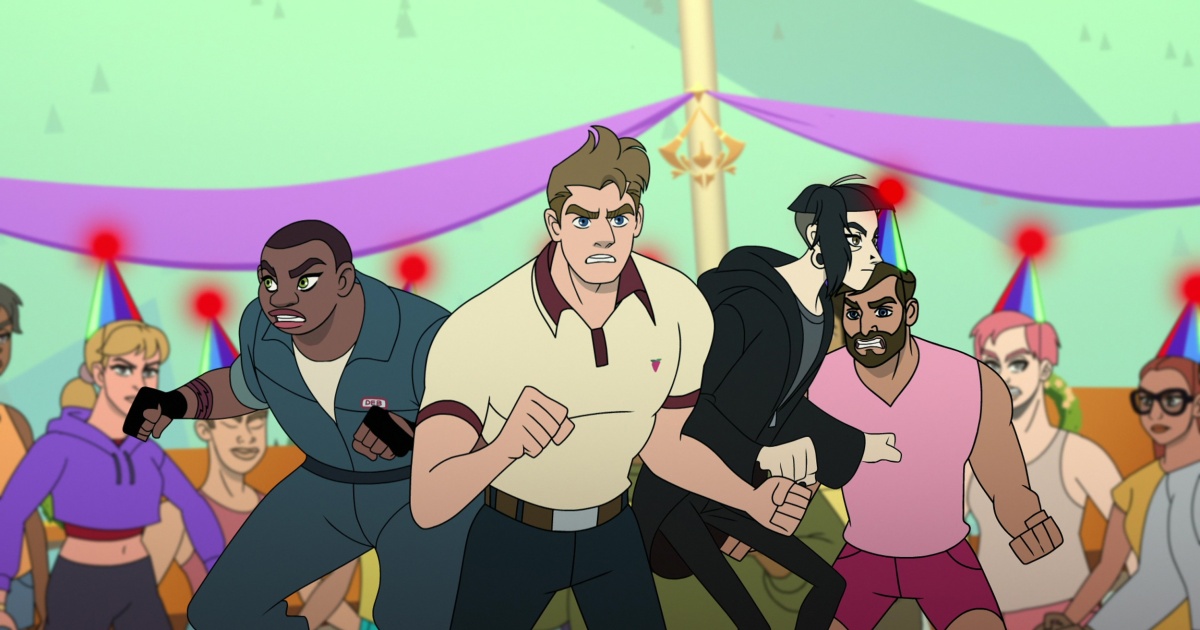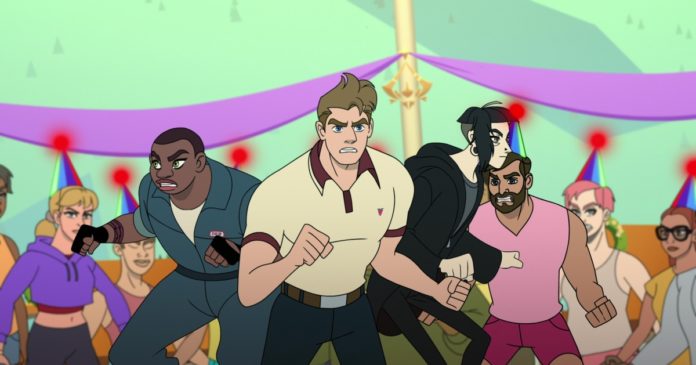
More than two and a half years ago, comedy veteran Sean Hayes and his producing partner, Todd Milliner, approached longtime television writer Gabe Liedman about working together on a new scripted series that would star Hayes as a “gay James Bond.”
After knocking the idea around for months, Liedman came up with the basic premise for “Q-Force,” an adult animated series that centers on a misfit and undervalued squad of LGBTQ secret agents — voiced by a predominantly queer cast of Hollywood heavyweights — and both subverts and embraces the tropes of the action-adventure genre.
“‘Q-Force’ is kind of like an underdog version of gay James Bond,” Liedman told NBC News in a video interview this week. “What if you are James Bond, but no one takes you seriously, because you’re different?”
Executive produced by Liedman, Hayes, Milliner, David Miner and Michael Schur (“The Good Place,” “Brooklyn Nine-Nine”), “Q-Force” follows Steve “Mary” Maryweather (Hayes), a former golden boy of the American Intelligence Agency (AIA) who, after coming out as gay, is sent to West Hollywood to disappear into obscurity. Instead, he assembles an all-star team of queer agents, including himself, expert mechanic Deb (Wanda Sykes), hacker Stat (Patti Harrison) and master of drag and disguise Twink (Matt Rogers).
After a decade of waiting for an official mission from the AIA, Mary becomes hellbent on proving himself to the agency that turned its back on him, and the Q-Force decides to solve a case on its own terms. But when they are reluctantly promoted in the field, the members must put up with a new and unruly member of the squad: Agent Rick Buck (David Harbour), who is Mary’s old rival and identifies as straight. (In addition to serving as creator and executive producer, Liedman also voices Benji, Mary’s sweet and charming love interest who is often put in danger due to his proximity to the Q-Force.)
From the outset, Liedman, who has served as a writer and producer on “Brooklyn Nine-Nine” and “PEN15,” always knew that he wanted to cast queer actors to voice queer roles to paint a wider picture of the LGBTQ community — a decision that he said was wholeheartedly supported by executives at Universal Television and Netflix, who ordered a 10-episode first season of “Q Force” in April 2019. (Universal Television and NBC News are owned by Comcast.)
“I really, really wanted it to be an ensemble — not just the story of this one guy, but the story of this squad,” Liedman said, “so that we could have a lesbian main character and a trans main character and just sort of tell a bigger, more community-based story.”
When he set out to write the pilot episode, Liedman decided to pull from many of the people in his own life, which, he said, allowed him to keep the show grounded. “Agent Mary is, in a lot of ways, based on me, which is embarrassing to say,” he said with a laugh. “Deb is based on one of my absolute best friends who’s a lesbian and who’s kind of the love and stability in my life; Stat is based on another friend of mine who actually wrote for the show, who’s a trans, goth, hilarious person.”
“Twink is based on, like, a thousand people,” he added, laughing. “I have a lot of people in my life who I love, who are very femme, cis, gay guys, who are brilliantly energetic and self-assured in these ways that I really admire and really wanted to put that onscreen and just say, ‘Yeah, even if you’re made fun of for being like this, you’re actually awesome.’”
During the process of crafting the first season with a predominantly LGBTQ writers’ room, Liedman said that working with animation opened up a realm of endless possibilities for storytelling and revealed that there were two serendipitous cases where the way a character was written matched up perfectly with the actor who voiced them.
“When I write, I like to have an actor in mind so that [I] can write better, more natural dialogue, as if someone is saying it. Wanda was always Deb in my head from the first line that I wrote for that character, so it was just a complete dream come true that we sent her the scripts and she was into it,” he revealed. “Matt, who plays Twink, was actually one of the writers on the show. He just did Twink better than anyone else who tried out. Nobody could touch him, and it was kind of a real-life Cinderella story. It’s kind of a dream if you’re a writer-performer in a writer’s room to get cast, and he really did.”
Over the course of the first season, Liedman said he “wanted to tell stories that felt like they were a fantasy, because the show exists in this completely made-up, crazy world.” But he still felt that it was important to ground the show in issues that directly affect the community, such as the violence and discrimination against queer people and the harmful practice of conversion therapy.
“It plays out in tackling some of those issues, but also creating moving love stories and having people mess up and try and fix it. It was really just about finding that balance along the way,” he said.
Having worked on this project for the better part of the last two-and-a-half years, Liedman — who joked that he is “anything but impartial” after having seen all of the episodes “8 million times each” — hopes that “Q-Force” will become part of the slight but steady advances that queer artists have made in traditionally straight spaces. “I don’t think our show’s going to change the world, but I do think every little step we take counts,” he said.
“As much as representation and politics play a huge part in the structure, foundation and life of this show, I also really, really hope that people just have fun with it,” he added. “There are breakthrough, dead serious, highly political works of art out there, and ‘Q-Force’ isn’t one of them — and it doesn’t need to be one of them either. I really wanted to say, ‘OK, we won the battle of selling this show. We can have fun now, right?’ That was a huge focus for me.”
But while Liedman wanted to “swing for the fences” in the first season — which includes sharp one-liners, graphic depictions of sexuality and cartoon nudity, and numerous pop culture references to the “Eurovision Song Contest” and the films “Brokeback Mountain” and “The Princess Diaries” — the creator and the rest of his production team have received sharp online criticism since the first teaser was released during Pride Month in June.
While some were “intrigued by the premise” and the combination of comedy and action, others have criticized the show for relying on “many exhausted tropes” and reinforcing stereotypes about the LGBTQ community. In response to the public outcry, which he has not yet addressed on social media, Liedman said that he thinks “representation is this really important and really, really fraught thing, and there’s a lot of anxiety around getting it right, so, obviously, it breaks my heart to think that, for a lot of people, maybe we didn’t do it right.”
“I know that you can have the best intentions, and it doesn’t really matter. It’ll strike people the way it strikes people, but I know that we were coming at this from a really loving place,” he continued. “We were not trying to reinforce stereotypes; we were trying to give people who see themselves in these characters a hug and a pat on the back and to lift them up. I expected some hate from the bigots — obviously, that’s where I expected most of the criticism to come from — but you can try your best and still fall on your ass. It happens to all of us, and we either did or we didn’t.”
At the end of the day, Liedman wanted “Q-Force” to be an unabashed celebration of the queer community, “and it was meant to be affirming, loving and funny,” he said. “I find pop culture references funny — a lot of the writers I worked with and a lot of my friends do as well. But I know that not everything is for everyone, but all I can speak to is what I hoped for … and my hope was for laughter and celebration.”
“Q-Force” is now streaming on Netflix.








